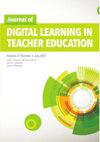未知领域的在线教学体验-加纳教育学院师生面临的挑战
Q1 Social Sciences
Journal of Digital Learning in Teacher Education
Pub Date : 2021-04-13
DOI:10.1080/21532974.2021.1892553
引用次数: 8
摘要
摘要学生满意度是任何有效在线学习所依赖的最高点。正是出于这个原因,教育工作者设计的课程活动使学生能够有效地实践,共同参与相关项目,以个性化他们的学习。在像加纳教育学院这样的新兴机构中,传统上倾向于通过传统的面对面互动来促进教师的专业发展,在线教育首次成为互动的媒介,以促进社交距离,应对新冠肺炎疫情,同时加强教育部门人力资源的获取和持续专业发展。这项基本的定性研究考察了加纳传统面对面教育系统中的在线教学行为。对半结构化访谈的分析表明,缺乏在线教学的基本基础设施。具体来说,在紧急远程教学环境中,学员们面临着互联网连接差、数据成本高的问题。由于这些挑战,很大一部分参与的学生教师不会为了工作和专业发展而选择在线学习。有鉴于此,该研究建议政策制定者将在线教育制度化,纳入加纳所有专业高等教育机构的课程。本文章由计算机程序翻译,如有差异,请以英文原文为准。
Online instructional experiences in an unchartered field - The challenges of student-teachers of a Ghanaian College of Education
Abstract Student satisfaction is the pinnacle upon which any effective online learning hinges. It is for that reason, educators design course activities that allow students to effectively practice, work together on relevant projects to personalize their learning. In emerging institutions like the Colleges of Education in Ghana that are traditionally inclined toward teachers’ professional development through conventional face-to-face interaction, online education became the medium of interaction for the first time to promote social distancing in response to COVID-19 pandemic while enhancing access and continuous professional development of the human resources for the education sector. This basic qualitative study examined the conduct of online teaching in a traditional face-to-face educational system in Ghana. The analysis of the semi-structured interviews revealed that the basic infrastructure for online teaching and learning is absent. Specifically, student trainees are saddled by poor internet connectivity, high cost of data in an emergency remote teaching environment. Due to these challenges, a significant proportion of the participating student-teachers wouldn’t choose online learning for their work and professional development. In view of this, the study recommends policy makers to institutionalize online education into the curricula of all professional institutions of higher education in Ghana.
求助全文
通过发布文献求助,成功后即可免费获取论文全文。
去求助
来源期刊

Journal of Digital Learning in Teacher Education
Social Sciences-Education
CiteScore
4.90
自引率
0.00%
发文量
15
 求助内容:
求助内容: 应助结果提醒方式:
应助结果提醒方式:


